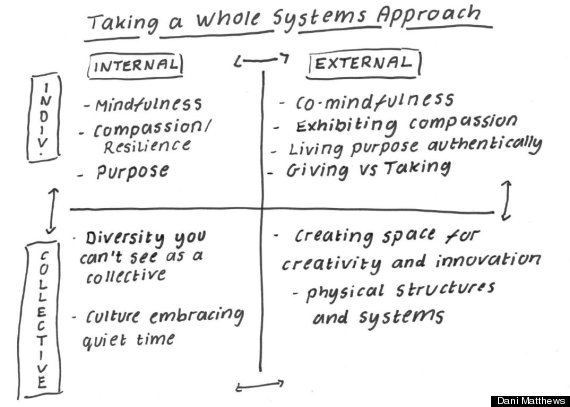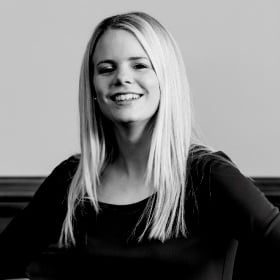I was fortunate to attend Wisdom 2.0 Business in New York, traveling from Sydney, Australia, to explore the question: What does wisdom look like in business? On reflection, for me wisdom is made up of a body of knowledge and experience which is best understood taking a whole systems approach. This key conference insight was triggered after Otto Scharmer’s session ‘From Ego to Eco system.’
To visualise this, I have mapped the key conference themes to Ken Wilber’s Four Quadrant Integral Model* (A Brief History of Everything, 1996) which we use regularly at IECL where I work.

*This four quadrant matrix contains an internal and external dimension. The internal dimension is the realm of the mind - the values, beliefs and thoughts that comprise the personality of the individual, and those that comprise the culture of the collective. The external dimension is the realm of action and behaviour. What is external is the outward manifestation of the internal, and can be readily seen or observed (IECL, 2014). Lets delve into the themes:
Giving vs. Taking
Adam Grant (author of Give and Take) explored three reciprocity styles — giving, taking and matching. His research shows givers are both the top and bottom performing in organisations. So helping others can accelerate or sink your career depending on your self-ambition. He describes takers (kiss up, kick down) as rising and then falling quickly once they get a reputation. Matchers (karma police) meanwhile protect themselves from exploitation.
Tip: Get the right people on the bus — weed out the takers who suppress others giving
Word of Caution: Watch out for agreeable takers who are the fakers — there is little correlation between agreeability and giving, including disagreeable givers!
Mindfullness: Responding Wisely vs. Reacting Blindly
The conference explored the opportunities and challenges of embracing the present moment in a fast paced world (mindfulness New York style). If people can practice mindfulness in the high energy city that never sleeps it is possible anywhere! I won’t go into the benefits of mindfulness as they are well researched and published. Instead I will share a snapshot of my standout presenter, Dan Harris, ABC News co-anchor.
Dan shared his mindfulness journey after having a panic attack live on air. Some of his anecdotes I noted included: “Meditation is like sports, one type is mindfulness which is like bicep curls for the brain.”
and “We spend so much time on our bodies, homes, cars — why not on our brain?”
Tip: The purposeful pause, at any point in our day we can stop, breathe and choose how we respond to any given situation.
Personal Insight: Through my own mindfulness journey I have found myself calmer, more purposeful, patient and connected to those around me.
Embracing Diversity Beyond What You Can See
Kruti Patel Goyal shared that when you feel different and excluded this takes up mindshare and labelled it ‘diversity tax.’ She explored an aspect of diversity I had never thought about; the dimensions of diversity you can’t see, i.e. the university your degree is from.
Tip: When recruiting, hire for shared values and priorities versus subjective measures (i.e. mirror of me).
Challenge: Be mindful of diversity dimensions we can and can’t see to limit the diversity tax by our actions.
Compassion for Resilience
A panel led by Sharon Salzberg started by dispelling the myth that compassion is weak and passive and that it is a gateway to resilience which takes courage and is trainable! My key insight here was “Self compassion is not selfish, it’s very hard to give from a place of depletion.”
Tip: You can train compassion through meditation and getting enough sleep!
Challenge: Wish that person who is on your ‘difficult’ list well from an authentic place.
Creating Space for Creativity and Innovation
Andy Berndt from Google shared how he creates the space for creativity and innovation by allowing his team to be their random, odd selves. He listens to them, asking who they are and what they have to say.
Tip: Mad access to everything encourages innovation.
Personal Insight: Creativity is making bridges between facts — nothing new exists in the world.
Co-Mindfulness: Initiating Relationship Repair
A panel discussion led by Eileen Fisher explored the notion of co-mindfulness — a quality of love, connection, trust and caring. To help create an environment of trust and safety it is important to initiate and repair existing broken relationships. This takes courage; willingness to hug a porcupine!
Tip: Listen intently, hold your tongue until they have finished their emotional story.
Challenge: Can you initiate relationship repair at work or with your family?
Purposeful Work
Marie Forleo shared how too many people are financially rich yet spiritually bankrupt. So, what to do? Find out what you love and merge it. For Marie this is her love of life and business coaching, fitness, writing and hip hop via her own You Tube channel.
Tip: Understand ‘Urgent versus important.’ Important = your purpose, family, health. Urgent = loud things like text messages, emails and social media. Leave these until the end of the day.
Word of Caution: Even if you love something you need to get passionate about the business side to make it a viable livelihood.
Wrapping Things Up
Wow what an event! I’m left thinking a lot... is co-mindfulness the next frontier?... What does wisdom mean to me personally?... Why don’t we teach mindfulness and compassion in more schools?
I do feel grateful that we are in a generation with some extraordinary goodness in the world. Would love to hear any thoughts and comments on the themes explored or anything else you feel relevant, or not in the spirit of creativity!



